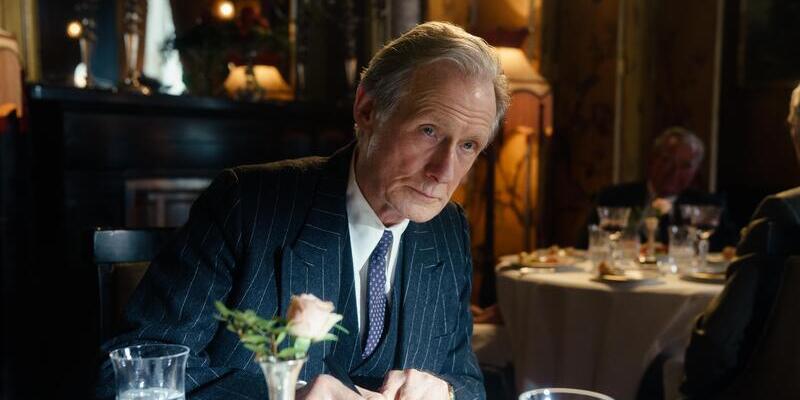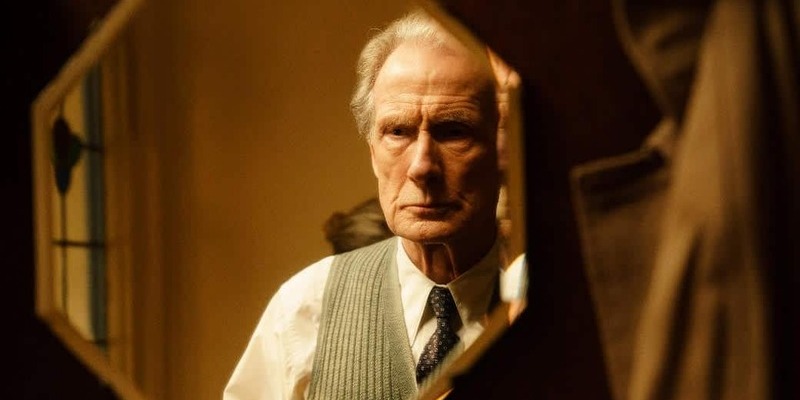
Review by
Eric Hillis
Directed by: Oliver Hermanus
Starring: Bill Nighy, Aimee Lou Wood, Alex Sharp, Tom
Burke

In recent decades I've formed the opinion that British and Irish movies
have become so blandly mid-Atlantic in their quest for the Yankee dollar
that if British and Irish people wish to see themselves represented on
screen they're better off watching Asian movies. The characters found in the
films of Korea's Hong Sang-soo and Japan's Hirokazu Koreeda may live on the
other side of the world, but they share common traits with the British and
Irish, i.e they're an emotionally repressed lot who only open up after a few
stiff drinks or upon receiving the news that they've been struck by a
terminal illness. A couple of recent British and Irish movies have bucked
the trend. Joanna Hogg's
Souvenir
films are so distinctly English that they feel like products of the past,
while Colm Bairéad's Irish language drama
The Quiet Girl
has broken records in Ireland, finally giving Irish people the chance to see
themselves on screen as they really are.

My opinion is cemented by Living, which is English with a capital E despite being a remake of a Japanese
film, Akira Kurosawa's Ikiru. It's also tellingly adapted by a screenwriter who is both English and
Japanese, Kazuo Ishiguro, who penned the very English novel 'The
Remains of the Day'. Kurosawa's film was inspired by Tolstoy's 'The Death of
Ivan Ilyich'. If you draw a line from London through Moscow to Tokyo, you'll
find a lot of emotionally repressed men who need a few drinks to open up, or
the news that they have mere months to live. The only time my late father
displayed any outward emotion to his family was when he was preparing to
undergo life-threatening surgery. It's not that he didn't love us, it's just
that he was Irish. That's just how we are.
Living's protagonist, taciturn, some might say stuffy civil servant Mr. Williams
(Bill Nighy), receives a terminal diagnosis from his doctor and
immediately decides he needs to start living. The trouble is, he doesn't
have the faintest idea of what that entails. Disappearing from the office he
has spent his adult life slogging away in, Williams takes a trip to a
seaside town where he is taken under the wing of a beatnik played by
Tom Burke (were the movie set in the 1980s rather than the '50s
you might surmise Burke is playing the same charming cad he memorably
essayed in
The Souvenir). The two spend a night drinking, with Williams even loosening up enough
to belt out a Scottish folk tune, a hint at an otherwise unacknowledged
Presbyterian streak in the dying man. But ultimately, Williams decides he's
simply having other people's idea of fun rather than his own.

Returning to London, Williams bumps into his former underling, the young
Margaret (Aimee Lou Wood). Margaret is looking for a reference for
her new employer, so Williams takes her to a fancy tearoom while he writes a
glowing appraisal of her time serving in his office. It's simply an excuse
to spend an afternoon in the company of someone who seems to have figured
out happiness in a way he never could himself, of course. Despite Margaret's
discomfort at the idea of spending time with an older man (which isn't
personal but rather motivated by apprehension about "what people might
say"), the two form a platonic friendship, with Williams learning to live
from the younger woman.
On the surface Williams might be dismissed as a horny old man enduring an
end of life crisis, but the film quickly dispels any such notion. It's
subtly hinted that the last time Williams experienced joy was while his
mother was alive, and rather than a potential lover, he appears to view
Margaret in a maternal light. Nurses will tell you that older men on their
deathbeds will often mistake them for their mothers, and while their
interactions may occur in bustling pubs rather than a solemn ward, the
dynamic is much the same between Williams and Margaret. The relationship
between the two plays out like a "nicecore" alternative to
Phantom Thread, and it's a pleasure to spend time in their company.

Less engaging is a Capra-esque sub-plot that sees Williams embark on a
crusade to fulfil the dream of a group of working class women who wish to
have a playground erected in their neighbourhood. It feels more befitting an
American movie starring Tom Hanks rather than this otherwise very English
film, and Living's closing 15 minutes make for a somewhat clunky tribute to its
protagonist. Prior to that, the film dared to portray Williams as far from a
saint (one scene sees him engage in the sort of casual racism and sexism
that was true to the era), so it feels odd when the movie closes out with an
emotionally overwrought elegy involving a policeman coming to tears at his
recollection of Williams. Perhaps I'm being too cynical, but you'll have to
excuse me. I'm Irish. That's just how we are.

Living is on Netflix UK/ROI now.
